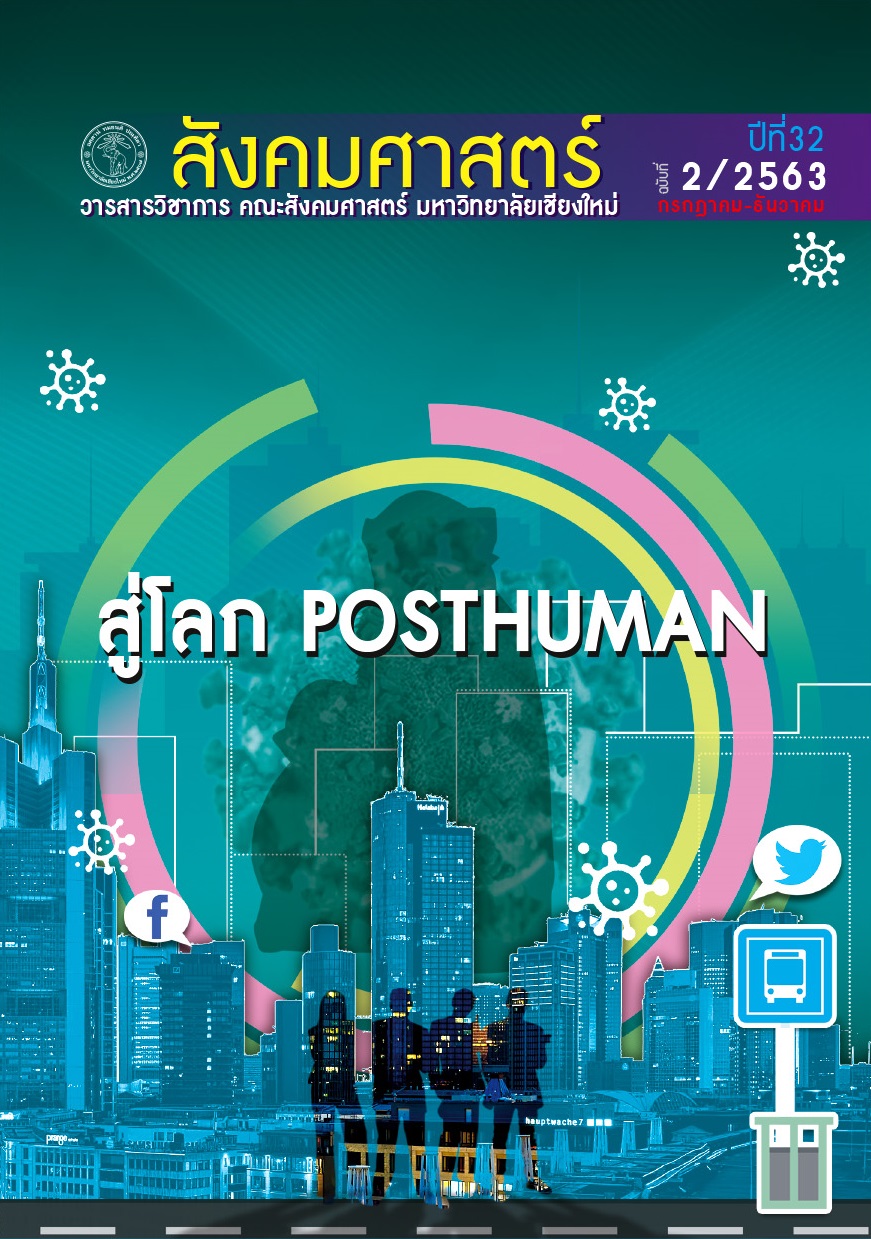บทบาทของมาตรฐานแรงงานสากลในการจัดการทรัพยากรมนุษย์ และการทำงานทางไกลระหว่างโคโรนาไวรัสแพร่ระบาด
Main Article Content
บทคัดย่อ
บทความนี้เสนอประเด็นของผลกระทบของโคโรนาไวรัสแพร่ระบาด และเกิดการทำงานทางไกลจากบ้านเป็นทางเลือกของการปรับตัวทางธุรกิจและสภาพการทำงานใหม่ของแรงงาน ไม่ว่าจะเป็นข้อตกลงการจ้างงาน เวลาการทำงาน และการคุ้มครองแรงงาน ข้อเสนอหลักเน้นที่แรงงานทำงานเต็มเวลาในรูปแบบของงานที่มีมาตรฐาน และใช้มุมมองแบบลูกจ้างเพื่ออธิบายบทบาทของมาตรฐานแรงงานสากลเป็นกรอบการศึกษาในการจัดการทรัพยากรมนุษย์ จึงเป็นเรื่องสำคัญสำหรับผู้เชี่ยวชาญด้านทรัพยากรมนุษย์ที่ต้องเข้าใจมาตรฐานแรงงานในรูปแบบของกฎหมายระหว่างประเทศ เนื่องจากงานในอนาคตจะเกิดการเปลี่ยนแปลงรูปแบบของการจ้างงานและเวลาการทำงานที่ยืดหยุ่น ซึ่งแรงงานทำงานทางไกลจะเผชิญกับความเสี่ยงและไม่มั่นคงมากขึ้นในโลกหลังโคโรนาไวรัส
Article Details
ข้อเขียนทั้งหมดทีปรากฏในวารสารสังคมศาสตร์ เป็นความคิดเห็นของผู้เขียนโดยเฉพาะ มิใช่ทัศนคติของคณะสังคมศาสตร์ มหาวิทยาลัยเชียงใหม่ หรือกองบรรณาธิการวารสารสังคมศาสตร์
เอกสารอ้างอิง
กฤษฎา ธีระโกศลพงศ์. 2563. “การบริหารแรงงาน: Gig Economy ตามทัศนมิติแรงงาน.” วารสารธรรมศาสตร์ 39 (1): 131-158.
Bailey, Diane E., and Nancy B. Kurland. 2002. “A Review of Telework Research: Findings, New Directions, and Lessons for the Study of Modern Work. Journal of Organizational Behavior: The International Journal of Industrial.” Occupational and Organizational Psychology and Behavior 23 (4): 383-400.
Baruch, Yehuda. 2001. “The Status of Research on Teleworking and an Agenda for Future Research.” International Journal of Management Eeviews 3 (2): 113-129.
Belzunegui-Eraso, Angel, and Amaya Erro-Garcés. 2020. “Teleworking in the Context of the Covid-19 Crisis.” Sustainability 12 (9): 3662.
Caligiuri, Paula, Helen De Cieri, Dana Minbaeva, and Angelika Zimmermann. 2020. “International HRM Insights for Navigating the COVID-19 Pandemic: Implications for Future Research and Practice.” Journal of International Business Studies 51: 697-713.
Daniels, Kevin, David Lamond, and Peter Standen. 2001. “Teleworking: Frameworks for Organizational Research.” Journal of Management Studies 38 (8): 1151-1185.
Duncan, Robert. 2018. Oxford Learner's Dictionary of Academic English. 5th ed. Oxford: Oxford University Press.
Eurofound and the International Labour Office. 2017. Working Anytime, Anywhere: The Effects on the World of Work. Geneva: International Labour Office.
Groen, Bianca. A. Sander P. van Triest, Michael Coers, and Neeke Wtenweerde. 2018. “Managing Flexible Work Arrangements: Teleworking and Output Controls.” European Management Journal 36 (6): 727-735.
Harbert, Anita and Jennifer Tucker-Tatlow. 2013. “Literature Review: Teleworking in Human Services”. Accessed July 25, 2020. https://theacademy.sdsu.edu/wp-content/uploads/2015/02/SACHS_Literature_Review_Telework_Report_2_2013.pdf
Hatfield, Steven and Sarah Cuthill. 2019. “The Alternative Workforce: It’s Now Mainstream.” In 2019 Global Human Capital Trends, 21-26. Deloitte. Accessed July 25, 2020. https://www2.deloitte.com/content/dam/insights/us/articles/5136_HC-Trends-2019/DI_HC-Trends-2019.pdf
Haworth, Nigel and Steve Hughes. 2015. “International Production, Global Governance and HRM.” In The Routledge Companion to International Human Resource Management, edited by David Collings, Geoffrey Wood and Paula M. Caligiuri, 86-98. London: Routledge.
Huws, Ursula et al. 1997. Teleworking: Guidelines for Good Practice. Brighton: The Institute for Employment Studies. Accessed July 25, 2020. https://www.employment-studies.co.uk/system/files/resources/files/329.pdf
Huws, Ursula, Nick Jagger, and Siobhan O'Regan. 1999. “Teleworking and Globalization. Brighton: The Institute for Employment Studies.” Accessed July 25, 2020. https://www.employment-studies.co.uk/system/files/resources/files/358.pdf
Huws, Ursula. 2019. Labour in Contemporary Capitalism. Hatfield: Palgrave Macmillan.
International Labour Office. 1999. “Decent Work”. Accessed July 25, 2020. https://www.ilo.org/public/libdoc/ilo/P/09605/09605(1999-87).pdf
International Labour Office. 2013. “Towards the ILO Centenary: Realities, Renewal and Tripartite Commitment.” Accessed July 25, 2020. https://www.ilo.org/wcmsp5/groups/public/---ed_norm/---relconf/documents/meetingdocument/wcms_213836.pdf
International Labour Office. 2016. “Non-standard Employment Around the World: Understanding Challenges, Shaping Prospects.” Accessed July 25, 2020. https://www.ilo.org/wcmsp5/groups/public/---dgreports/---dcomm/---publ/documents/publication/wcms_534326.pdf
International Labour Office. 2017. “Synthesis Report of the National Dialogues on the Future of Work.” Accessed July 25, 2020. https://www.ilo.org/wcmsp5/groups/public/---dgreports/---cabinet/documents/publication/wcms_591505.pdf
International Labour Office. 2019a. “Work for a Brighter Future. Global Commission of the Future of Work.” Geneva: International Labour Office. Accessed July 25, 2020. https://www.ilo.org/wcmsp5/groups/public/---dgreports/---cabinet/documents/publication/wcms_662410.pdf
International Labour Office. 2019b. “ILO Centenary Declaration for the Future of Work.” Accessed July 25, 2020. https://www.ilo.org/wcmsp5/groups/public/@ed_norm/@relconf/documents/meetingdocument/wcms_711674.pdf
International Labour Office. 2019c. “Guide to Developing Balanced Working Time Arrangements.” Accessed July 25, 2020. https://www.ilo.org/wcmsp5/groups/public/---ed_protect/---protrav/---travail/documents/publication/wcms_706159.pdf
International Labour Office. 2020a. “COVID-19 and the world of work: Impact and policy responses.” Accessed July 25, 2020. https://www.ilo.org/wcmsp5/groups/public/---dgreports/---dcomm/documents/briefingnote/wcms_738753.pdf
International Labour Office. 2020b. “ILO Standards and COVID-19 (Coronavirus) - (Key provisions of international labour standards relevant to the evolving COVID-19 outbreak).” Accessed July 25, 2020. https://www.ilo.org/wcmsp5/groups/public/---ed_norm/---normes/documents/publication/wcms_739937.pdf
International Labour Office. 2020c. “ILO Monitor: COVID-19 and the World of Work.” Fifth edition (Updated estimates and analysis). Accessed July 25, 2020. https://www.ilo.org/wcmsp5/groups/public/@dgreports/@dcomm/documents/briefingnote/wcms_749399.pdf
International Labour Office. 2020d. “A policy Framework for Tackling the Economic and Social Impact of the COVID-19 Crisis.” Accessed July 25, 2020. https://www.ilo.org/wcmsp5/groups/public/@dgreports/@dcomm/documents/briefingnote/wcms_745337.pdf
International Labour Office. 2020e. “Working from Home: Estimating the Worldwide Potential.” Accessed July 25, 2020. https://www.ilo.org/wcmsp5/groups/public/---ed_protect/---protrav/---travail/documents/briefingnote/wcms_743447.pdf
International Labour Office. 2020f. “Employers and Workers Negotiating Measures to Prevent the Spread of COVID-19, Protect Livelihoods and Support Recovery: A Review of Practice.” Accessed July 25, 2020. https://www.ilo.org/wcmsp5/groups/public/---ed_protect/---protrav/---travail/documents/briefingnote/wcms_749844.pdf
International Labour Office. 2020g. “Teleworking During the COVID-19 Pandemic and Beyond: A Practical Guide.” Accessed July 25, 2020. https://www.ilo.org/wcmsp5/groups/public/---ed_protect/---protrav/---travail/documents/publication/wcms_751232.pdf
International Labour Office. 2020h. “Work From Home: Human Factors/ergonomics Considerations for Teleworking.” Accessed July 25, 2020. https://www.ilo.org/wcmsp5/groups/public/---ed_protect/---protrav/---safework/documents/publication/wcms_742061.pdf
Kaushik, Meenakshi and Neha Guleria. 2020. “The Impact of Pandemic COVID-19 in Workplace.” Accessed July 25, 2020. https://www.researchgate.net/profile/Meenakshi_Pandey8/publication/ 342011150_The_Impact_of_Pandemic_COVID_-19_in_Workplace/links/ 5ede65e892851cf13869888b/The-Impact-of-Pandemic-COVID-19-in-Workplace.pdf
Messenger, Jon C. 2009. “Work Sharing: A Strategy to Preserve Jobs During the Global Jobs Crisis.” Accessed July 25, 2020. https://www.ilo.org/wcmsp5/groups/public/---ed_protect/---protrav/---travail/documents/publication/wcms_120705.pdf
Messenger, Jon C. 2018. “Working Time and the Future of Work (ILO Future of Work Research Paper Series).” Accessed July 25, 2020. https://www.ilo.org/wcmsp5/groups/public/---dgreports/---cabinet/documents/publication/wcms_649907.pdf
Messenger, Jon C. 2019a. “Introduction: Telework in the 21st Century: An Evolutionary Perspective.” In Telework in the 21st Century: An Evolutionary Perspective, edited by Jon C. Messenger, 1-34. Cheltenham: Edward Elgar.
OECD. 2020. “Human Resource Management in the Context of Coronavirus (COVID-19).” Accessed July 25, 2020. http://www.sigmaweb.org/publications/SIGMA-HRM-coronavirus-inventory-ideas-09072020.pdf
Parker, Geoffrey G., Marshall Van Alstyne, and Sangeet Paul Choudary. 2016. Platform Revolution: How Networked Markets are Transforming the Economy and How to Make Them Work for You. New York: W.W. Norton and Company.
Sánchez, Angel Martinez, Manuela Pérez Pérez, Pilar de Luis Carnicer, and Maria Jose Vela Jiménez. 2007. “Teleworking and Workplace Flexibility: A Study of Impact on Firm Performance.” Personnel Review 36 (1): 42-64.
Scott, John. 2014. A Dictionary of Sociology. 4th ed. Oxford University Press.
Sullivan, Cath. 2003. “What's in a Name? Definitions and Conceptualisations of Teleworking and Homeworking.” New Technology, Work and Employment 18 (3): 158-165.
Tremblay, Diane‐Gabrielle. 2013. “Telework.” In Sociology of Work: An Encyclopedia, edited by Vicki Smith, 871-872. Los Angeles: SAGE.
Unni, Jeemol. 2018. “Formalization of the Informal Economy: Perspectives of Capital and Labour.” The Indian Journal of Labour Economics 61: 87–103.
Verbeke, Alain, et al. 2008. Growing the Virtual Workplace: The Integrative Value Proposition for Telework. Cheltenham: Edward Elgar.
Vnoučková, Lucie. 2020. “Impact of COVID-19 on Human Resource Management.” Revista Latinoamericana de Investigación Social 3 (1): 18-21.


